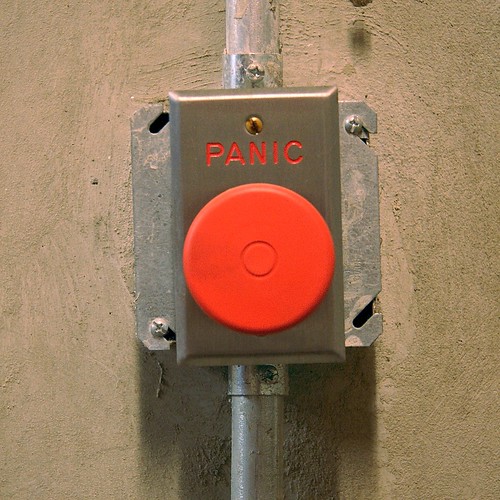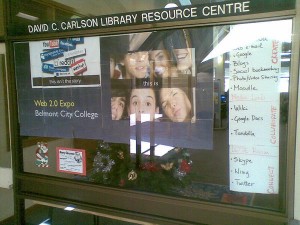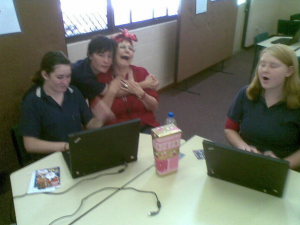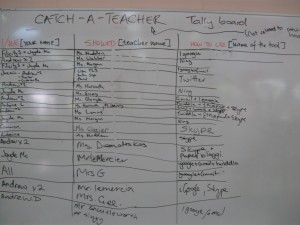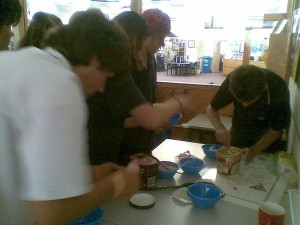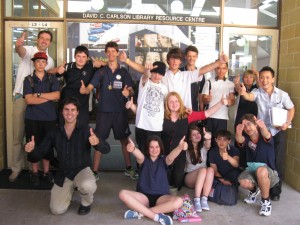
If you’ve been around the ed-tech universe lately, you’ve probably heard’em all:
- it is imperative we change education from the industrial revolution paradigm to a more creative, collaborative, connected endeavour
- digital technologies afford us to do it so easily – just look at us and so many kids doing this ‘Web Two Oh’ stuff and flourishing
- standardised testing is cancer of education, death of learning
- we can learn anytime, anywhere like no other time in human history
- it’s about personalising learning, connecting, constructing together
- we need the political will and leadership to make these changes
- we can’t ignore the fact that kids today send bazillion text messages a minute, friend thousands and Skype their grandma across the world at the drop of a hat … but they ‘power down’ when they come to school
- social media is the new way of communicating, learning, working together
- creativity is the new currency and schooling kills it
- tech is the great leveller
- pro-ams, long tail, cognitive surplus and flat world are becoming the norm, maaan
- so many teachers just wouldn’t listen, refuse to engage and frankly, are poor learning role models for the kids in front of them
- add so on …
Add a few more, find a couple of nice pictures to go with it (all kosher with Creative Commons, of course) and you can charge yourself out at a nice speaking fee. Many ‘gurus’ do.
Now, I am not cynically dissing something I have been a part of for many years now. I love it. I DO think it is the way of the future and the future may be a little brighter (especially if you are with the ‘in’ crowd…).
In this discourse teachers, the much maligned and much adored creatures, favourite topic of pundits (Presidents, Prime Ministers, obscenely rich and other ‘dignitaries’ included) are the source of inspiration and frustration. But the bulk of teachers are pretty much still plugging away as they have for the last few decades.
“Why haven’t things changed, why aren’t teachers more creative, passionate, wanting to learn about what they do?” often goes with the undertone of grinding teeth in disbelief at practice of some of our colleagues. Well, I have a hunch …
I tweeted this earlier today:
What’s holding education ‘stuck’ isn’t lack of creativity, passion or knowledge of teachers but fears. Can you name some? Thx #edfear
and got some great responses, most of them tagged (on Twitter) with #edfear hashtag :
- Teaching stdnts wrong stuff not backed by authority. Stdnts not learning formal.critical thinking. They are my personal ones #edfear (@sirexkat)
- 1. Fear of failure 2. Fear of job loss 3. Fear of Criticism 4. Fear of Success 5. Fear of being the only one (@weemooseus)
- #edfear being sacked, learners with ego problems, frightened administrators, poor curricula (@philhart)
- #edfear: fear of doing something that is too new/innovative to have any academic research to prove its worth (@malynmawby)
- the usual fear of the unknown not all educators are adventurous and keen to dive into a new technoworld #edfear (@playnice_nz)
- not sure the teachers with the biggest fears will be on twitter. #edfear (@kanemayhew) 🙂
- Fear from parents that their child will be missing something essential. (@bonitadee)
- What’s holding education ‘stuck’ …Fear of missing something…we must cover it all #edfear (@bonitadee)
- fear of change, being ir/relevant, keeping up – infowhelm, time to maintain/update skills #edfear – see Cloudworks too (@k8tra)
- Is the number one #edfear the loss of the self-perception as ‘giver of knowledge’? (@irasocol)
- Is the number two #edfear the identity hit which comes from understanding that you’ve succeeded in a terrible system? (@irasocol)
- fear of failure, change, conflict, ostracism – and all of these are from ‘the lizard brain’ (@mrwejr)
- key fear is ‘what if it goes wrong’? Also not all leaders are creative…many just want a steady ship #edfear (@dmchugh675)
- school leaders fear vocal parents who believe that the things that worked for them in their education should still work today.#edfear (@dmchugh675)
- Creativity Fear – Fear that if I introduce creative activities I won’t be able to adequately compare or assess their work. #edfear (@funcreativity)
- #edfear fear of failure? fear of wasting time? fear of inertia? (@tokyoedtech)
… and hopefully more to come. Thank you all who have replied (and if don’t follow these guys yet, a good list to connect with!)
I am not offering any definitive answers here, deliberately so. I do have a hunch (I’ve even sent a draft proposal for a PhD proposal looking at this sort of thing today, *gulp*) but I am ‘fishing for ideas’ … in a fine connected manner 😀 . So, that tweet again:
What’s holding education ‘stuck’ isn’t lack of creativity, passion or knowledge of teachers but fears. Can you name some? Thx #edfear
I would love to hear from you, comments or @ replies (@lasic, tag #edfear) all fine. Many thanks!
